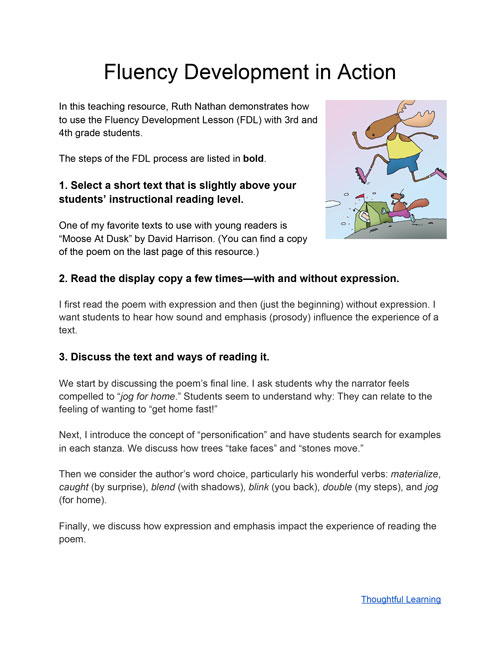
When it comes to reading, fluency is fundamental.
Students can learn strategies to comprehend new information, predict upcoming text, and connect reading to personal experience. In the process, they improve speed, accuracy, and expression.
Improving fluency requires regular practice and support. You can give your young readers the support they need by following the steps in the Fluency Development Lesson (FDL).
Steps to Developing Fluency
- Select a short text (e.g., poem, flash fiction, informational article, song) that is slightly above the students’ instructional reading level. Make two copies for each student. Display another for the class.
- Read the display copy a few times—with and without expression.
- Discuss the text and ways of reading it. You might ask, “What part stood out?” “Did any words delight or confuse you?” “What was different about reading with and without expression?”
- Read the text chorally as a whole class (or in small groups) two or three times. Avoid round-robin reading.
- Divide students into groups of two or three. Provide time for each group member to read the text aloud, ideally more than once. If word recognition problems surface, the listeners should provide help and encouragement.
- Invite students to perform their text for an audience (other groups, a volunteer, a teacher aide, etc.).
- With students, select a group of words from the text to study more closely. Define the words, and relate them to a larger concept (word parts, compound words, rhyme, etc.).
- Have students take home a copy of the text and read it aloud to family, friends, or neighbors.
- Before starting a new text, ask students to reread previous selections for reinforcement.
Featured Teacher Resource: Fluency Development in Action
Writers Express author Ruth Nathan demonstrates how to use the Fluency Development Lesson with 3rd and 4th graders while reading the poem “Moose At Dusk” by David Harrison. The poem is included in the download.
Download the PDF or copy the Google Doc.
Teacher Support
Consider this support when you teach the FDL.
Level
1–5
Learning Objectives
By practicing the Fluency Development Lesson, students will . . .
- Develop sufficient reading accuracy and fluency to support comprehension.
- Read a grade-level text with purpose and understanding.
- Read grade-level poetry orally with accuracy, appropriate rate, and expression on successive readings.
- Determine the ideas and meaning of a text read aloud.
- Read and perform collaboratively.
Time
At least twice per week for 30 minutes (additional time may be needed for performances)
Teaching Tips
- Utilize a diversity of listening and reading strategies: class choral readings, group choral readings, individual readings, and performance.
- Avoid calling out individual students to read aloud to the entire class, as it may create anxiety. Whole-class and group choral readings take the spotlight off individuals and help students build comfort using their voice.
- For enrichment, have students record themselves reading the text. Provide an anchor chart to help students self-assess: Does my reading sound smooth? Do I pay attention to punctuation? Compare an initial reading with a reading after having completed all the FDL steps.
- For formative assessment, consider these options while also noting that accuracy is more important than speed:
- Ask students to read a text with and without expression. (This can be great fun, especially when students read with partners.)
- Have students pick a text and time themselves reading it more than once, graphing their times.
- Give students a totally new text and let them time themselves after each subsequent reading.
Cheers to Contributors!The Fluency Development Lesson was developed by Timothy Rasinski, a professor of literacy education at Kent State University. Visit his website to learn more about his great work. David Harrison is an award-winning author and poet. Recently, he co-authored Empowering Students’ Knowledge of Vocabulary: Learning How Language Works and Guided Practice for Reading Growth. Ruth Nathan co-authored Write Away, Write on Track, and Writers Express. She works as a visiting professor and school teacher in California. |
